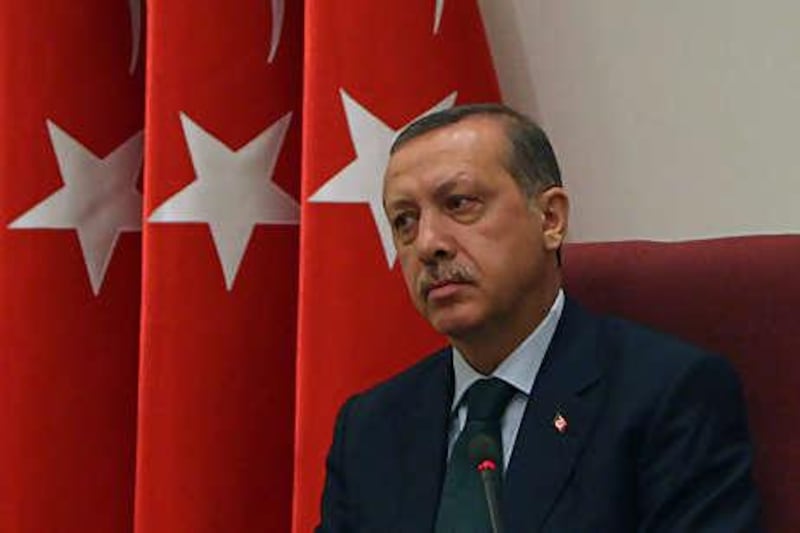ISTANBUL // Turkey's military, one of the most powerful institutions in the country, has suffered a major setback in a power struggle with the government, a development that could mark a turning point in efforts to strengthen civilian oversight over the armed forces, observers say.
For decades, top generals in Turkey have enjoyed much more autonomy from political oversight than military officers in many western countries, including the power to decide personnel questions without government interference. This week, however, they did not get their way, as both the prime minister and the president rejected the military's choice for officers to fill top posts. The fact that the heads of the second-biggest fighting force in Nato did not prevail is seen as a sensational event by politicians, media and observers
In a sign of bitter divisions between soldiers and civilians here, the posts of chief of general staff and land forces commander remained vacant yesterday, even though a meeting of generals and politicians ended on Wednesday evening and although they had reached an agreement about the man to fill the post of chief of general staff, Gen Isik Kosaner. The delay was seen as a sign of protest by the military against the government's approach.
Both sides regarded the promotion issue as a test of power that went far beyond the simple question of which officers would be transferred to which posts. Relations between the military and the elected government are a delicate subject in Turkey, where generals have pushed four cabinets from power since 1960. "This power struggle should have taken place 50 years ago, before all those military take-overs of the last decades could happen," Nevzat Tarhan, a former army doctor in a leading military hospital in Ankara, said in a television interview. "In Turkey, the civilian, elected politicians had never been able to assert themselves until now."
But results of four days of tense discussions in the so-called Supreme Military Council, or Yas, suggest that the balance of power is shifting towards the civilians. "The government got what it wanted", the Vatan daily said on its front page yesterday. The military's reputation had already been dented by a string of judicial investigations into suspected coup plots hatched in army ranks. During the Yas session, generals tabled plans for the promotion of 11 officers that have been charged with taking part in a coup plan code-named "Sledgehammer". According to prosecutors, the plot was hatched in 2003, shortly after the government of Recep Tayyip Erdogan, the prime minister, came to power. Many in the strictly secular military regard Mr Erdogan as a religious fundamentalist who wants to turn Turkey into an Islamist state.
Together with Abdullah Gul, the Turkish president, whose signature is needed for Yas decisions to become law, Mr Erdogan objected to the suggested promotions. According to media reports yesterday, the prime minister also rejected the proposed move of Gen Hasan Igsiz to the post of land forces commander, the traditional grooming ground for future chiefs of general staff. Gen Igsiz has been asked by prosecutors in Istanbul to explain his suspected links to several anti-government propaganda websites. Content of some of those websites was used by the judiciary two years ago as evidence in an unsuccessful attempt to have Mr Erdogan's ruling party banned.
Generals have rejected the accusations as a politically motivated smear campaign against the armed forces. But by insisting on the promotions of the 11 officers linked to "Sledgehammer", despite laws saying that promotions were out of the question for personnel charged with a crime, the military badly miscalculated, Murat Yetkin, a columnist for the Radikal newspaper and close observer of Turkey's top officers, wrote yesterday. "The military went into this fight even though there were big risks it would lose."
As a consequence, Turkey's generals can no longer be sure of the political power they have enjoyed since their first coup in 1960. Turkey, a candidate for EU membership, is under pressure to change its long-standing political arrangements, Oktay Gonensin, a Vatan columnist, wrote yesterday. "It will not be easy to change a system that everyone has gotten used to in the course of half a century, but Turkey has to succeed in doing so, with the help of the army and the civilians", he said.
The government wants the country to take a further step on September 12, when a referendum will decide the fate of a package of constitutional amendments that includes laws to strengthen the power of the civilian judiciary over army decisions. But some Turks fear that the Erdogan government will use the humiliation of the army to push an Islamist agenda. Nejat Eslen, a former general, told the CNN-Turk news channel that a "power struggle between the secular, democratic republic and the supporters of political Islam in government" was underway. "The Turkish army has been the defender of the democratic republic, and the politicians are trying to break its traditions in order to sideline it," he said.
foreign.desk@thenational.ae





